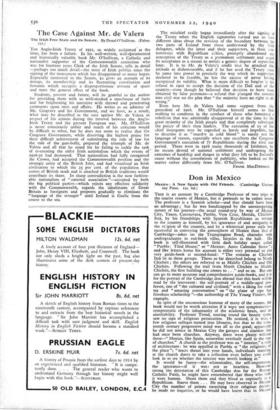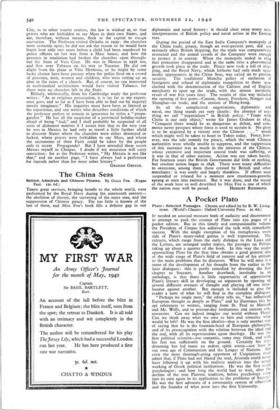Don in Mexico
THIS is an account by a Cambridge Professor of two trips to the tourist resorts of Mexico, but it pretends to be rather more. The professor is a Spanish scholar—and that should have been an advantage ; but he was handicapped by the unenterprising nature of his journey—the usual round-trip by way of Mexico City, Taxco, Cuernavaca, Puebla Vera Cruz, Merida, Chichen- Itza, by his friendships with Puebla, Republicans as strange to the country as himself, by his ignorance of and antipathy to the religion of the country, and by a whimsical prose style less successful in conveying the atmosphere of Mexico than that of Cambridge—jokes on the Tnunpington Road, charades with undergraduates in red-brick villas, bicycles in the hall. His book is self-illustrated with little dark holiday snaps called " Puebla : Tiled House," or "Mexico: Aztec Calendar Stone "; and like letters home his account is either very personal or else very guide-book at second-hand: "The remains at Chichen Itza lie in three groups. Those so far described belong to North Chichen ; the others are referred to as Middle Chichen and Old Chichen. Following the trail from North Chichen to Middle Chichen, the first building one comes to .. ." and so on. But one can go to more accurate and comprehensive guide-books, and it is for the portrait of the Cambridge don abroad that this book will be read by tfie 'irreverent: the self-portrait of a middle-aged pro- fessor, one of "the cultured and civilised," with a liking for weak tea and "amusing conversation" on "the plane of ripe but frivolous scholarship "—the authorship of The Young Visiters, for example. In spite of the unconscious humour of many of the scenes, the book would not be worth attention if it wgre not symptomatic— symptomatic of the inhumanity of the academic brain, and its unreliability. Professor Trend, touring round the beauty spots, saw no sign of religious persecution. He noticed, it is true, a few religious colleges turned into libraries, but that to the nine- teenth century progressive mind was all to the good; apparently he did not notice in Mexico City the garages and, cinemas that had once been churches. Anyway, there were plenty without these—" Mexico, like Spain somewhat overbuilt itself in the way of churches." A church to ;.he professor was an "interior," a style of architecture: he was appalled in Puebla at " the religiosity of the place"-' "tracts thrust into your hands, individuals standing at the church doors to take a collection even before you could look in to see ;whether the interior was worth -looking at" It would be funny—the whimsicality, the self-importance, the ignorance—if it wer.! not so heartless. However strong the detestation of this Cambridge don for the Roman Catholic Faith, he might have remembered tbat those who held it were human. Shoot them and they bleed as copiously as Republican. Starve them . . . He may have observed in Mexic° City the number of priests exercising their religious duties, he made no inquiries, or he would have learnt that in Mai°
City, as in other tourist centres, the law is winked at, so that priests who are forbidden to say Mass in their own States, and are, therefore, without means, flock to the capital to escape starvation. The Professor visited Orizaba in 1939: the churches were certainly open; he did not ask the reason or he would have learnt how only two years before a child had been murdered by police officers on her way from a Mass house, and how the peasants in retaliation had broken the churches open through- out the State of Vera Cruz. He was in Mexico in 1938 too, and flew over Tabasco on his way to Yucatan. He did not alight from his plane at Villa Hermosa, or he might by some lucky chance have been present when the police fired on a crowd of peasants, men, women and children, who were setting up an altar in the ruins of a church. But, of course, no one interested in ecclesiastical architecture would have visited Tabasco, for there were no churches left in the State.
Blithely, whimsically, from his Cambridge study the professor writes : "As to religious persecution, it is (so far as my experi- ence goes, and so far as I have been able to find out by inquiry) mostly imaginary." His inquiries must have been as limited as his experience, and any writer who describes conditions of which the professor prefers to remain in ignorance he styles a "propa- gandist." He has all the suspicion of a provincial holiday-maker afraid of being "had," and I shall probably be suspected of all sorts of dishonest motives if I assure him that in the very year he was in Mexico he had only to travel a little further afield to discover States where the churches were either destroyed or locked, where priests were forbidden to say Mass, and where the sacraments of their Faith could be taken by the people only in secret. Propaganda? But I have attended these secret Masses myself in Chiapas. I doubt if my assurance will carry conviction: for as the Professor writes, "My Mexico is not like that," and on another page, "I have always had a preference for legends rather than for more sober history."
GRAHAM GREENE.



























































 Previous page
Previous page